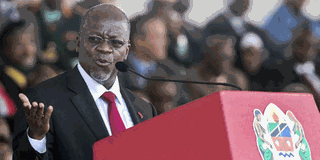Populism earns Magufuli both friends and foes

Tanzania's President John Pombe Magufuli speaks during his swearing-in ceremony in Dar es Salaam on November 5, 2015. AFP PHOTO
What you need to know:
- Magufuli has shown a talent for publicity-grabbing stunts that bolster his no-nonsense, corruption-busting, man-of-the-people reputation and have made him popular.
- A recent opinion poll gave President John Magufuli a staggering 96 per cent approval rating.
- Magufuli has shut down newspapers, banned opposition rallies, switched off live broadcasts of parliamentary sessions, applied a draconian cyber crimes law to jail critics, and permitted a messy and unfair election to pass in semi-autonomous Zanzibar.
DAR ES SALAAM
When a photo of a smiling President John Magufuli, sitting in the economy class of a plane, appeared on Twitter days ago, it was widely praised as another example of his personal austerity and common touch.
That the picture was in fact an official photo opportunity at the launch of two new Air Tanzania planes — Bombardier Q400s that only have an economy class and never left the ground — made no difference to his local fans and those abroad.
Since winning last October’s election, Magufuli has shown a talent for publicity-grabbing stunts that bolster his no-nonsense, corruption-busting, man-of-the-people reputation and have made him popular.
He won the poll with 58 per cent of the vote. A recent opinion poll gave him a staggering 96 per cent approval rating.
Yet at the same time, his readiness to act on impulse worries some who see an authoritarian streak at the core of his populism.
Magufuli has shut down newspapers, banned opposition rallies, switched off live broadcasts of parliamentary sessions, applied a draconian cyber crimes law to jail critics, and permitted a messy and unfair election to pass in semi-autonomous Zanzibar.
“We’re being blind to the negative stuff,” said Nic Cheeseman, a professor of African politics at Oxford University, who argues that Magufuli’s good and bad moves stem from a worrying willingness to break the rules.
“When he marches into a place and dismisses people without due process, he’s acting in a populist way, but at the root of that is the same thing that sees him going against the rules in banning rallies,” Cheeseman said.
Magufuli, whose nickname “tingatinga” means “bulldozer” in Kiswahili, began his presidency by sweeping the streets on independence day, appointing a streamlined cabinet, firing officials suspected of ineptitude or corruption, sacking latecomer civil servants and banning first class tickets, expensive foreign travel and costly allowances.
The cost-cutting earned him the approving and popular #WhatWouldMagufuliDo hashtag with which Twitter users shared their often-humorous money-saving ideas.
It played well in the country where generations of same-party rule had left the youthful population disenchanted with traditional politics.
The selection of a relatively unknown 56-year-old former works minister, unencumbered by corruption, was a master stroke by the ruling Chama Cha Mapinduzi, said Nicodemus Minde, a Tanzanian political analyst.
“The CCM brand was tarnished, but Magufuli’s was not,” Minde said, allowing for a semblance of change while perpetuating CCM rule.
Opposition politicians rail against Magufuli “for turning Tanzania into a dictatorship”.
DEMOCRATIC SPACE
The claim is surprising, given their performance in the vote in which the opposition won control of major cities, including Arusha and Dar es Salaam, and more parliamentary seats than before.
Adjoa Anyimadu, a researcher at Chatham House think tank in London, says Tanzanian presidents generally serve two five-year terms, meaning it is too early to say whether this constriction of democratic space is going to continue to tighten over Magufuli’s presidency.
Nevertheless, he appears “a bit of a throwback to the early days of multiparty democracy in Tanzania,” a sentiment shared by some who see him as a reincarnation of Julius Nyerere, Tanzania’s founding father and an authoritarian socialist.
As president he has made just two visits abroad, to Rwanda and Uganda, and hosted the president of the Democratic Republic of Congo.
The presidents of the neighbouring three countries are notorious hardliners bent on staying in power.
Magufuli has skipped two African Union summits and been a no-show at three trade and development forums in Kenya, leading Minde to worry that Magufuli’s stated focus on domestic issues may damage Tanzania’s regional and international standing, as well as being seen as rude and undiplomatic.
Magufuli’s campaign slogan was “Hapa kazi tu!” meaning “We’re here to work!” and that desire is used to justify clampdowns on those perceived to be blocking his political programme.
But the concern that democracy is being sacrificed in the name of development is a serious one, particularly in a region with precedents, among them Ethiopia, Rwanda and Uganda, where success in development and economic growth gave leaders a pass on rights and freedoms with foreign donors.
“When a leader gets used to breaking rules, institutions get weaker and then the question comes further down the line: are the checks and balances on power still there?” said Cheeseman.




